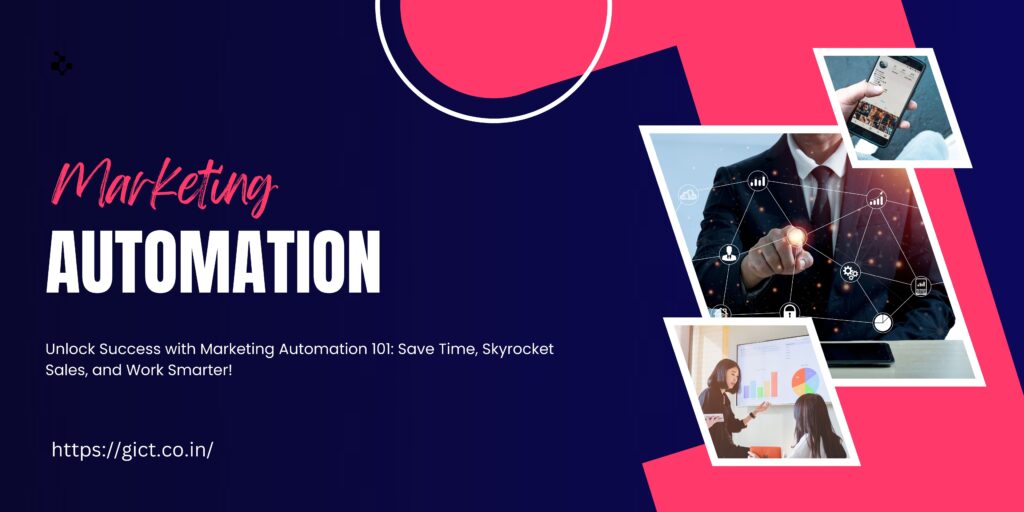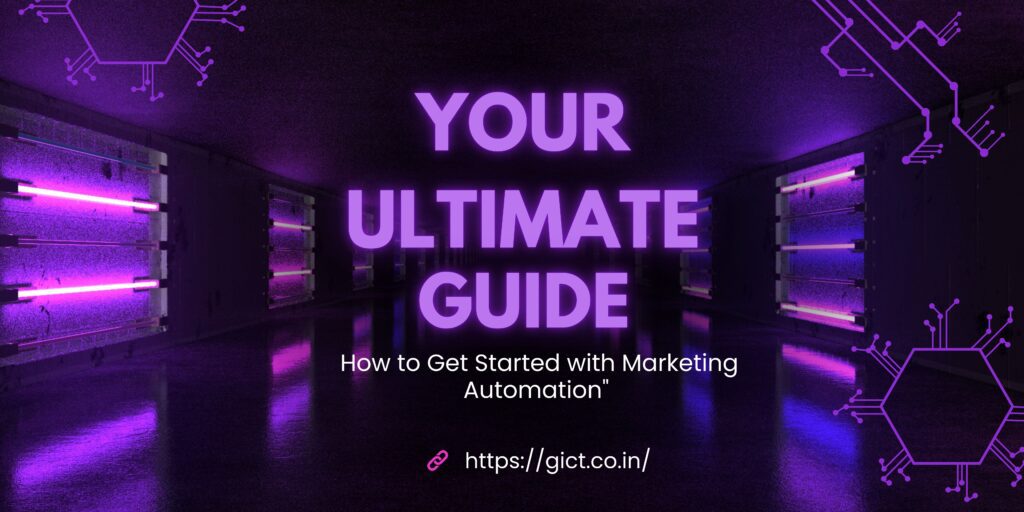Marketing Automation 101: Save Time, Increase Sales, And Work Smarter
With the pace of digital change today, marketers have to do more with less — tight budgets, rich data, and the need for personal experiences. Marketing Automation is the solution. It automates repetitive tasks, engages customers on a deep level, and creates more sales, without wasting valuable time and resources.From email personalization to lead nurturing and social media scheduling, automation can do them all so that marketers can spend their time on strategic campaigns instead of tasks. Keep reading to learn about marketing automation, its benefits, and how you can get started. You’ll understand how it can help you grow your business as well as effectively drive sales once you’re through.

What Is Marketing Automation?
Marketing automation is the application of software and technology to automate repetitive marketing processes and tasks. Marketing automation allows companies to make marketing easier, more efficient, and more effective by enabling them to reach the right people at the right time with the right message without having to do everything manually at each step.
Fundamentally, marketing automation provides businesses with the ability to maintain multi-channel campaigns (e.g., email, social media, and website pages) more efficiently and precisely. Through the automated execution of efforts such as email campaigns, social media updates, customer segmentation, and lead nurturing, businesses have the ability to maintain consistent engagement with their audiences while saving considerable time and resources.
For instance, instead of sending one-by-one emails to every lead or customer, a marketing automation software can send personalized emails automatically depending on triggers like a customer’s behavior or engagements with your brand. Likewise, automated posting on social media keeps your brand up and online even when your workforce is off.
All in all, marketing automation enables companies to expand their marketing operations, enhance customer engagement, and provide more customized experiences without compromising efficiency or effectiveness. It’s a matter of working smarter, not harder, and making authentic connections with your audience through automation.
The Key Benifits Of Marketing Automation
Marketing automation is a very effective tool that has many benefits for companies of all sizes. It saves marketers time, boosts sales, and makes them work. More effectively by automating repetitive tasks and processes. Some of the most important benefits that marketing automation has to offer are listed below:
1. Save Time And Increase Efficiency
One of the greatest benefits of marketing automation is that it can automate tedious manual tasks. Rather than dedicating hours to doing the same thing over and over again, such as sending emails one by one, posting on social media, or processing customer data, automation lets you do all these things automatically.You can send emails, tweet, and process lead nurturing with the click of a button using automated workflows. This leaves your marketing team free to focus on strategy and creativity, and not repetitive operational tasks.
2. Increase Sales And Conversions
Marketing automation improves sales by allowing you to contact leads when you should with the appropriate content. For instance, automated email flows can guide leads through the sales process by sending customized emails based on their behavior, interests, or where they are in the buying process. This focused strategy enhances the chances of conversion since prospects are provided with timely, relevant information that addresses their needs. Automation tools can also assist companies in identifying high-potential leads and ranking them, allowing sales teams to concentrate on prospects with the highest chances of conversion.
3. Improve Lead Nurturing And Customer Engagement
With marketing automation, you are able to offer personalized and consistent communication with your audience, which results in stronger relationships and better customer retention. Automated emails, for example, can be personalized based on a customer’s interests, buying history, or engagement with your website, which makes them feel appreciated and known. This type of personalization encourages deeper engagement and repeat business while being automatically managed. In addition, automation enables companies to execute multi-channel campaigns that are targeted, thereby providing a consistent and integrated customer experience.
4. Better Customer Segmentation
Marketing automation platforms usually feature native segmentation abilities whereby you are able to separate your audience depending on certain stipulations, be it demographics, actions, or historical interactions. Segmenting your audience means you can deliver highly relevant and targeted content to each segment and have a greater chance of turning them into regular customers. As an example, you could deliver one email campaign to new subscribers and another to long-term clients, with each message being of relevance to the recipient.
5. Measure And Optimize Campaign Performance
One of the best things about marketing automation is that it can monitor and report on the performance of your campaigns in real time. Automation platforms offer advanced analytics that enable you to understand how your emails, ads, and social media updates are performing, so you can make informed decisions. By knowing this information, you can adjust and fine-tune your campaigns to enhance their performance, so you can always be operating with the best possible plan of action to produce results.
6. Consistency And Accuracy
Automation ensures that your marketing is consistent across channels. With automated workflows and pre-scheduled campaigns, you can be certain that your branding and messaging are on track whether you’re posting on social media, sending an email campaign, or nurturing leads. Automation also prevents the risk of human error such as sending the wrong email to the wrong segment or posting outdated content leading to more accurate and reliable marketing campaigns.
7. Scale Your Marketing Efforts
As your business expands, so does the demand for scalable marketing solutions. Marketing automation enables you to scale your efforts without a corresponding rise in resources. You can keep on reaching more customers, cultivating more leads, and executing more campaigns—all without having to expand your team size or workload.Scalability is essential for companies that want to grow successfully and economically.
In short, marketing automation is not a time-saver alone; it’s about extending your marketing capabilities, driving increased sales, and producing more customized, successful campaigns. By automating the mundane, companies can get smarter, connect with their customers better, and drive higher rates of success.

How To Get Started With Marketing Automation
Marketing automation has the power to transform your marketing campaigns, making them more effective and efficient. Here’s an easy-to-follow guide to assist you in getting started:
1. Define Your Goals: Determine what you need to accomplish through automation, i.e., lead generation, sales conversion, or customer retention.
2. Select the Right Tool: Choose a marketing automation tool that best suits your requirements. Some popular tools are HubSpot, Mailchimp, ActiveCampaign, and Pardot.
3. Segment Your Audience: Divide your audience by demographics, behavior, or purchase history to offer relevant, personalized content.
4. Create Workflows and Campaigns: Automate workflows for procedures like welcome emails, lead nurturing, cart abandonment reminders, or re-engagement campaigns.
5. Develop High-Quality Content: Make your automated content helpful and personalized. Focus on problem-solving, question-answering, and using good calls-to-action (CTAs).
6. Monitor and Optimize: Periodically review campaign performance through metrics such as open rates, click-through rates, and conversions to optimize your strategy.
7. Scale Small and Gradually: Start with basic tasks, like email campaigns, and then scale up your automation processes to more intricate workflows and channels.
8. Train Your Team: Make sure your team knows how to leverage automation tools efficiently. Offer training, resources, and invite feedback to ensure that everyone is on the same page.
By following these steps, you can effectively incorporate marketing automation into your strategy, enhancing efficiency and delivering better outcomes.
Overcoming Common Challenges In Marketing Automation
Marketing automation has the potential to be revolutionary, but companies tend to encounter challenges when implementing it. Here’s how to get past typical issues:
Lack of Clear Strategy and Goals: Automation will be wasteful without specific goals. Solution: Create well-defined, measurable goals such as generating more leads or converting sales. Map out the customer lifecycle and integrate automation with long-term business objectives.
Poor Integration with Current Tools: Integrations can create silos of data and inconsistent communication. Solution: Select platforms that integrate well with your current systems, or leverage open APIs to support smooth data transfer.
Over-Automating and Forgetting Human Touch: Over-automating can be impersonal. Solution: Balance automation with human touch. Personalize automated messages and provide human touchpoints, such as follow-up emails by sales representatives.
Lack of Proper Data Management: Low-quality data may impede the effectiveness of automation. Solution: Clean and segment your data on a regular basis. Employ data enrichment tools to better understand customer preferences.
Technical Complexity: Certain platforms are not easy to learn. Solution: Choose tools with an easy-to-use interface, utilize training resources, and hire an expert if necessary.
Insufficient Content for Automation: Without quality content, automation won’t engage your audience. Solution: Develop a content strategy and repurpose existing materials for your campaigns.
Not Measuring or Analyzing Performance: Without tracking results, it’s hard to improve. Solution: Use platform analytics to monitor KPIs like open rates, conversions, and ROI. A/B test and iterate based on data.
Budget Restraints and ROI Issues: Automation is expensive. Solution: Begin in small ways with impactful automations, measure ROI, and expand as results demand.
By resolving these challenges, you can realize the full benefit of marketing automation.
The Future Of Marketng Automation
Marketing automation is set to experience tremendous growth as technology keeps evolving, changing the way companies engage with customers. The future will be influenced by increased personalization, integrated simplicity, and intelligent automation through different channels. Below are important trends that are shaping the marketing automation future.
1. Hyper-Personalization With AI And Machine Learning
Machine learning and AI will allow companies to provide highly customized experiences by examining huge customer data. Customer behavior will be forecasted, customized content will be generated, and real-time suggestions will be offered through automation tools, ensuring more efficient and relevant customer engagement.
2. Seamless multi-Channel Integration
The future of marketing automation will be seamless integration across email, social media, SMS, mobile apps, and even offline. Companies will maintain consistent messaging on all touchpoints so that there is a single experience for the customer. Marketing platforms will combine data across different channels, giving the 360-degree view of customers.
3. Increased Use Of Chatbots And Conversational Marketing
Chatbots powered by artificial intelligence will have a central role to play in customer support, lead gen, and customized marketing. Bots will deliver real-time support 24/7, hold one-on-one conversations, and hand over to humans at the appropriate junctures, enhancing customer satisfaction and conversions.
4. Voice Search And Assistant Integration
As voice search and voice assistants such as Alexa and Google Assistant gain traction, marketing automation will evolve to voice-based experiences. Campaigns will be voice-activated so that customers can engage with brands using voice commands, and content will be voice search optimized.
5. Focus On Data Privacy And Ethics
As data privacy laws such as GDPR and CCPA continue to develop, marketing automation platforms will prioritize ethical data gathering and open practices. These technologies will assist organizations in remaining compliant while providing customized, opt-in marketing and maintaining secure management of customer information.
6. Advanced Analytics And Reporting
The future will include more advanced reporting and analytics within marketing automation. Predictive analytics will enable businesses to predict the success of campaigns, maximize resources, and more accurately measure ROI. AI-based reporting will allow marketers to make real-time analyses of customer actions and campaign effectiveness.
7. AI- Assisted Content Creation
Marketing automation will make increasingly greater use of AI to aid in content creation, such as in blogs, emails, and social media posts. AI will generate high-quality, personalized content at scale, and also collect relevant content from a variety of sources to make sure the right content is delivered to the right people.
8. Integration With Customer Lifecycle Automation
Future marketing automation will go beyond lead generation to handle the full customer lifecycle. Through integration with CRM and sales applications, automation will drive customer retention, loyalty, and advocacy through personalized offers, upsell opportunities, and post-purchase interaction.
As these trends evolve, marketing automation will continue to enhance business efficiency, drive growth, and improve customer experiences by providing deeper insights and smarter, more personalized interactions.
Ready to make marketing easier and sell more? Get started today automating, and see your business grow faster, smarter, and more effectively!
Conclusion
Marketing automation is no longer a nicety but a requirement for companies that desire to scale cost-effectively, enhance customer experiences, and drive their bottom line. With repetitive tasks automated, you can liberate precious time, provide more targeted marketing, and generate more sales conversions. The secret to effective automation is choosing the appropriate tools, knowing your customer’s path, and continually refining your tactics. Through marketing automation, you can work smarter, not harder, and keep your business ahead in the rapidly changing marketing landscape.



